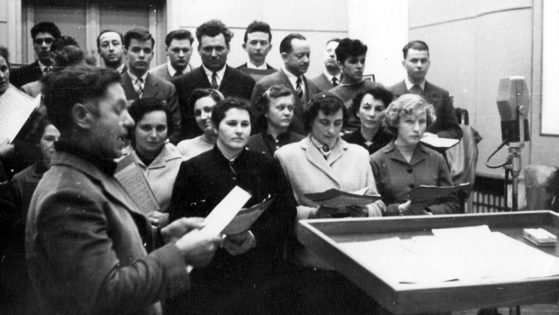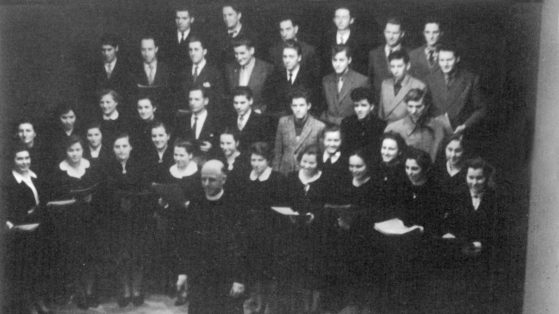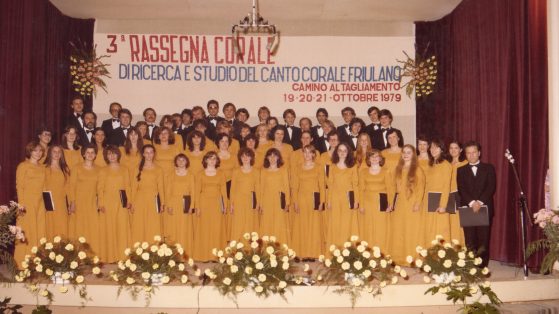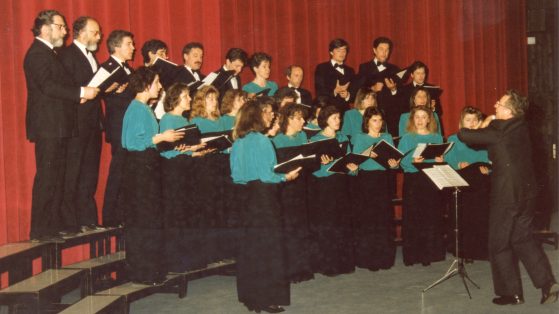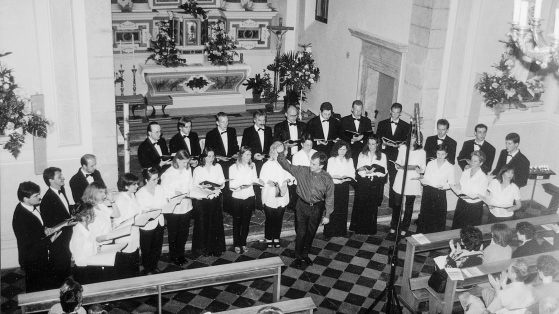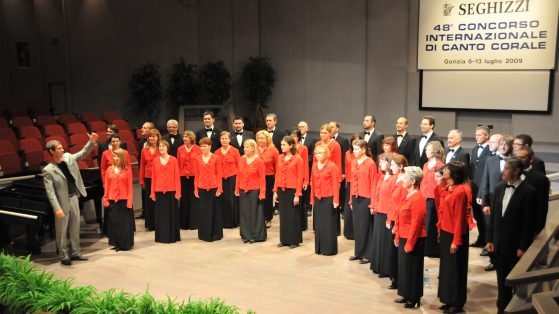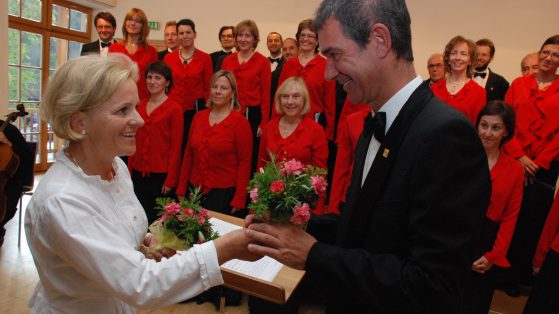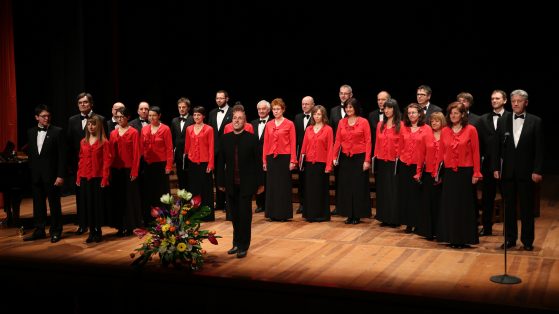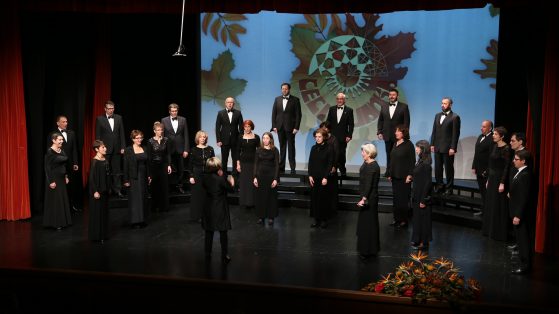ABOUT US
Music expresses that which cannot be said and
on which it is impossible to be silent
- V. Hugo -

About us
The mixed voice choir (MePZ) “Lojze Bratuž” is a singing group from Gorizia (Italy). The group is grounded exclusively on voluntary work, on enthusiasm towards singing and on the loyalty to the Slovenian language. In this sense it is included in the Association of Slovenian catholic education (Slovenian: Zveza slovenske katoliške prosvete) and in the Cultural centre “Lojze Bratuž” (Slovenian: Kulturni center Lojze Bratuž) as well as into the civil organisation of the Slovenian minority in Italy.
The choir was established in 1951. Its aim is to collect singers from Gorizia and its surroundings who cherish good singing. Since 1957, the choir has been named after the musician Lojze Bratuž, who sacrificed his life for his love of Slovene songs during the fascist era.
Choir activities
In its more than 50-year history, the choir, in addition to its regular activity in the Friuli Venezia Giulia region, has also had concerts in Slovenia, Italy, France, Switzerland, the Czech Republic and Austria. The choir has been awarded many prizes, including the Jubilee Award of the Public Fund of the Republic of Slovenia for its 50 years of activities. In addition to classical polyphony, the choir cultivates love for Slovene folk and musical compositions. It is also aware of Slovenian contemporary composers. Today, the choir consists mostly of young members who are residents of Gorizia and the surrounding area, including Slovenia. There are some Italian-speaking members in the group who are actively learning Slovenian. By integrating people of various countries, languages, and nationalities, the choir remains faithful to its goal of fostering connection, cooperation and coexistence among nations.
Our history, our path
Origins
In the Calendar of the Goriška Mohorjeva Society for the year 1952, Zas, a member of the Slovenian Catholic Educational Society, gave a report on the educational work in the Goriška region. These are his thoughts: “The plough, which was set up in December 1949, left behind the first furrows. It is gratifying that the effort was not in vain, because the work that started back then is now being continued in a more planned way. During our educational evenings, a circle of people gathered to follow this work with joy and interest.” His statements regarding the prolific 1951 season are the following: “In our closing lecture on the 20th of June, we discussed the political and cultural history of the Slovenes of Gorizia. We got acquainted with those individuals who offered invaluable help to start the development of our people. Mirko Filej’s choir performed for us for the first time, and this was the perfect end to the evening.” This date became known in the history of choral culture in the Goriška region as the birth date of the choir which was named after Lojze Bratuž only a few years later. The choir worked for many years as a member of the society until 1973, when it embarked on a more independent journey with its conductor who is also a member of the committee.
First steps
After the war, Slovenians of the Goriška region eagerly began to assemble fragments of their cultural wealth, which had been so violently and cruelly robbed and shattered throughout the fascism period. It is not surprising that the Slovenian songs (Lojze Bratuž was one of fascism’s first victims because of his passion for Slovenian songs) were the first to be sung as they were the most prosecuted alongside other written works in Slovenian. Enthusiastic singers, among them Polde Doljak, a big fan of musical muses, who was prematurely killed in a traffic accident near Chiavari, gathered into a sufficiently homogeneous group which, under the experienced guidance of Professor Mirko Filej, the founder and leader of the choir, quickly grew into an enviable music group. They had remarkable success everywhere. Shortly afterwards, they started performing more demanding compositions, including opera arias with solo inserts. Young pianists Lojzka Bratuž, Andrej Bratuž and Iva Hrovatin also undertook this endeavour, as they enriched their singing performances with their determined accompaniment.
In 1957, they also successfully performed Sattner’s cantata, The Oath of Jephthah. The charismatic musical spirit of prof. Mirko Filej and his extraordinary courtesy, liveliness, optimism, and simplicity impressed the audience to such an extent that similar remarks were heard: “The culmination occurred when a student from Dolina gave a bunch of flowers to Mr. conductor, which he accepted so kindly and warmly, that residents from Dolina and many other neighbours would never forget this gesture…” (KatG February 10, 1955). The choir performed several times in various ensembles (mixed, male, female and even as an octet), sometimes with the orchestra and with the soloists. Unfortunately, professor Filej passed away prematurely. His death left a void that was difficult to fill, as Filej was an excellent pedagogue (even today several conductors from his school still work in the Goriška region), organiser (he was the founder of the organ school in Piazzutta to educate organists for our churches) and an exceptional priest: he also managed the renovation and improvements of the Church of St. Giovanni, for which he nurtured great love from his arrival in Gorizia until his untimely death. A few months after his death at a memorial evening in the new hall of the Catholic Home, which was prof. Filej great desire, someone wrote: “When the curtain opened and a large choir of Lojze Bratuž stood on the stage in front of us, all hearts were constricted in pain. This was his choir, his true love for which he was sentenced to death. His wish was that all singers would perform on stage wearing uniforms. This was one of his last concerns before his death. He provided the singers with the uniforms, but when his idea came true that evening, he could not experience it.” (KatG October 4, 1962). After having led the choir for more than ten years, Mirko Filej re-established the meetings with fellow countrymen from Trieste. Furthermore, he created the first interactions with the Slovenians from Carinthia and, by doing so, he united those Slovenians who remained outside the motherland. According to the critics, the choir achieved an enviable artistic level and creative power in its first years. As early as 1951, at the memorial for the 20thanniversary of the death of the archbishop F. B. Sedej, the choir sang, in addition to Gallus’ Ecce quomodo, the “psalm From the depths” too which was composed by the doyen of Slovenians of Friulian Slavia Ivan Trinko for the fifth death anniversary of the deceased archbishop. However, the song could not be performed back then since the Gorizia police headquarters at the time banned any external celebration in honour of the deceased archbishop. Therefore, this rather demanding composition by msgr. Trinko was premiered on Wednesday, November 28.” (KatG December 6, 1951). There were similar premieres since professor Filej, an excellent musician and composer, often rearranged or readapted his work for his choir. The first performances were unforgettable, e.g., a concert of songs by the composer Vinko Vodopivec from Primorska (1953) and two concerts in Trieste (1955). His heartfelt wish for the choir to have comfortable rooms for weekly rehearsals came true when the Catholic Home was extended. Unfortunately, professor Filej could not visit the Home as he died in the year of its inauguration. The beloved Mirko Filej was succeeded
by his student, professor Ivo Bolčina, who prepared the choir for the international singing competition C. A. Seghizzi on two occasions – in 1963 and 1964 (when Stanko Jericijo replaced Ivo Bolčina as the conductor due to Bolčina’s illness). At the request of the cathedral chapter, the choir participated in the archbishop’s masses in the Gorizia cathedral church throughout the 1964-1965 season. These performances had a substantial public response. However, they posed a great challenge to the choir regarding the study and interpretation of the songs. Two examples of such arduous endeavour are the choir’s performances at two masses, cf. at the mass of Gruber’s Erste Sonntag Messe and at the Messa a due voci pari of C. Dobicij. The period during which the choir was led by Ivo Bolčina is thus characterised mainly by church music, as singing in the Gorizia cathedral church required considerable preparation and a unique approach from the singers towards sacred music.
“The golden era”
In 1965 the position of conductor was taken over by prof. Stanko Jericijo, the chaplain for Slovenian worshippers in the church of St. Giovanni and an outstanding musician. He brought many novelties to the choir. He paid special attention to the singing technique and the interpretation. He wanted each singer to delve into the lyrics and message of the song, taste its beauty and then express these features vocally. Professor Jericijo’s selfless and tenacious work with the choir lasted more than thirty years. During this time, he created many compositions which were all premiered by the choir. This period was distinguished by polyphony, Slovene folk and adapted songs, as well as more daring compositions by contemporary Slovene authors. Although the tradition of polyphonic singing dates to the time of Professor M. Filej, professor Jericijo was the one to guarantee it a more permanent and regular role. In three long decades, the choir perfected countless compositions of Renaissance masters, particularly those of Jakob Petelin Gallus who occupies a place of honour. The choir’s repertoire expanded quickly, singers were very inclined towards polyphonic compositions which were extremely rare in the programs of Slovenian choirs in Italy, and most likely completely absent in the Goriška region. In accordance with the expansion of its program and with its more varied offer, the choir also aimed for a larger audience and for more places to carry out performances. It is probably the first Slovenian choir based in Italy to perform far abroad and unite Slovenian emigrants with a song. In 1977, the choir impressed the Slovenians of Paris, who were, to everyone’s delight, able to bring along many French to the concert. This performance is still memorable among fellow Slovenians of Paris. The choir managed to connect other Slovenians around the world with the presentation of its musical creativity by performing in Rome (for this occasion the recording took place in the great auditorium of Vatican for Slovenian broadcasts of Radio Vatican), by travelling twice across Switzerland and by having a concert among Slovenians in Milan. The choir gradually began to undertake the works of local contemporary composers, who repeatedly dedicated their compositions to the choir L. Bratuž. In addition to the conductor himself, it is opportune to mention mainly Andrej Bratuž, Ubald Vrabeca and Pavle Merkù. Thanks to them, many premiere performances were made available to the choir (e. g., Merkù’s Parcè a mi Signor in 1979 in Camino al Tagliamento; Vrabec’s Na goriškem Travniku in 1992). Around the eighties, the choir had some performances in the form of a women’s ensemble led by Franka Žgavec, and in 1980 it appeared in the magazine Primorska poje in Trieste.
Beside conducting the choir L. Bratuž, Prof. Jericijo was also the conductor of the parish choir Sant’Ignazio. For this reason, he wanted to establish closer ties between the two choirs in terms of singing cooperation. This ingenious idea paid dividends rather soon: in 1975 both singing groups performed in the church in Piazza Vittoria with various polyphonic compositions sung by both choirs. For Gorizia, this was a pleasant novelty and an immense musical experience. In the following years, performances at Italian music events in Gorizia became more frequent (e. g., concerts in the Church of St. Giovanni on the religious holiday of St. Cecilia, Christmas concerts in the Provincial Auditorium). The collaboration with the aforementioned Italian choir culminated with the presentation of the composition Missa Octo vocum by Francesco Bianciardi (1572-1607). The concert took place in Siena, the birthplace of Bianciardi, in Kranj, Venice and Millstatt in Austria. The vocal music is being joined by instrumental accompaniment in these last years. The choir has enriched its musical offer with vocal-instrumental compositions and has worked together with some neighbouring choirs. A stand-out performance worth mentioning is Jephthah’s oath, H. Sattner’s cantata for choir, soloists, and orchestra. The cantata, based on Gregorčič’s text, was sung by the choir with great success at Cankarjev dom in Ljubljana. In the beginning of the 1990s, the choir prepared some high-profile monographic concerts, often in relation with important anniversaries, such as a cycle of Gallus’ compositions to commemorate the composer’s 400th death anniversary, and a concert of Vodopivec’s church works. It is worth mentioning the magnificent celebration held during the Pope’s visit to Gorizia in 1992. For that event, the L. Bratuž Choir as well as some Italian and Friulian choirs, accompanied by the orchestra and led by Stanko Jericijo, performed the mighty composition Tu es Petrus, composed by the conductor himself.
The end of the old, the beginning of the new
However, since the choir is a living organism, subject to environmental influences and dependent on the greater or lesser commitment, will, motivation and sacrifice of its members, there were some moments of crisis and discouragement in the Lojze Bratuž choir. Yet no one in Gorizia could imagine that this choir would just disappear from the musical stage. That is why the issues were being solved slowly but steadily. During this time, the singers and their conductor prepared several concerts of church songs which were then sung in various churches in the Goriška region and in Slovenia. In 1997, Stojan Kuret took over the artistic direction of the choir. New singers enrolled in the choir, and the cooperation with the Slovenian Center for Music Education E. Komel was strengthened. The conductor opted for a new approach towards the learning and reproduction of musical works. The exploration of innovative ways of musical creativity as well as the conductor’s wit and professionalism paid dividends very soon. At the inaugural musical performance with the new conductor on the 20th of June 1997 in the church of St. Giovanni in Gorizia, the choir executed Vivaldi’s Magnificat. At the end of the 1990s, the singers entertained the public of Gorizia with a collection of Pavle Merkù’s songs to celebrate the composer’s 70th birthday. In the series of events Characters of our past (which included concerts, the presentation of songbooks, evenings of discussions about history etc.) the choir performed the works of Danilo Fajgelj in Breda Šček and therefore continued the tendency to display of monographic songs of local composers which started at the beginning of the decade.
From 2001 until the end of the 2013/2014 season, the choir was led by Bogdan Kralj, while the young conductor and poet David Bandelj guided the choir until the end of the 2018/2019 season. Since then, the choir has been led by Mira Fabjan, a conductor from Trieste.
It has been a long journey…
In the first post-war years, when radio was just making its way into Slovenian homes, the L. Bratuž Choir enlivened the Christmas holidays with a performance on the 10th of January 1954 (live?) on Radio Trst II. In the following decades, many recordings followed for the radios of Trieste (e. g., in the Catholic House on the 29th of May 1970 and on the 27th of May 1973) and Radio Koper (Judicial Hall in Nova Gorica on the 4th of March 1973), as well as for Radio Vatican (1975). The choir also recorded some songs for the cassette of ZSKP choirs on the 18th of May 1990. It should be emphasized that many members of the L. Bratuž choir have participated in major music events within the ZSKP, most notably in recent years. It was also thanks to them that Sattner’s cantata Olives (1994) and operettas At the White Horse (1996) and The Hop Princess (1999) were a great success. The singing family always devoted much attention to encourage a friendly relationship among members, sociability, and relaxation in nature. The choir went on its first trip to the Dolomites shortly after being founded on the 26th of July 1959. This trip was followed by many others, most notably the pilgrimage and excursion to Brezje in 1962, the ascent on Mangart in 1967, the excursion to Logarska dolina on September 27, 1970, the trip to Rakov Škocijan on June 22, 1975, the excursion to Vienna, Olomouc and Prague following the steps of Gallus from April 25 to 28, 1991, the trip to Dolenjska in 1992, to Škofja Loka on June 13, 1993, and the summer retreat to the hut of St. Joseph in the spring of 1999.
To mix business with pleasure even in the summer, the leadership of the choir organized a singing holiday in the hut of St. Joseph in Camporosso in Valcanale. Although not all the singers participated in this holiday of work and relaxation, the experience of mutual deliberation and contemplation was extremely useful. The days of study were enlivened by Ubald Vrabec (1979), Jože Trošt (1980), Janko Ban (1981) and Stojan Kuret (1982) who offered their invaluable knowledge and expertise to the participants. The choir has tried since its beginning to strengthen both national awareness and the love for the homeland thanks to Professor Mirko Filej. To achieve this, the choir had a diversified program, which included enjoyable Slovenian songs and works from music all over the world, e. g., polyphony and opera arias. The choir is devoted to these principles even at present. From the very beginning, critics have acknowledged the choir’s sophistication and elegance in performance and- its distinct lyricality when singing certain musical genres. For many years, the choir has been the leading entity in Gorizia and in the wider Primorska music scene, mainly due to its program selection, high quality performances, and due to its connecting role. Namely, singers from the surrounding villages also collaborated with the choir because they sensed the possibility of advancing and improving their music and singing skills. It is safe to say that the choir was an example of a homogeneous and friendly group, which is of great importance for our border area. Thanks to the qualified choirmasters, the surrounding choirs began to achieve great success and the program choice was adjusted accordingly. The number of singers in the Lojze Bratuž choir decreased significantly, as they preferred to join their local choir for practical reasons and for the awareness of belonging to their village community. Due to the leading role in the Slovenian cultural and musical space of the town centre which the choir still maintains today, young people from the town should be more responsible for the future of the choir. We must be indifferent in times of crisis, as everything in this world is imperfect, fleeting, and subject to the influences of time and environment; instead, we must confront our problems and find appropriate solutions to current challenges.
Today the choir has a rich historical repertoire: many performances, radio recordings, a series of excursions and holiday-work days, but also numerous friends who follow the choir’s achievements and converse about old times. Some performances are unforgettable to this day (Paris, Rome, Einsiedeln). Former singers sincerely want the rejuvenated choir to take the path of strength, clarity, and optimism, to enjoy moments of artistic distraction while recreating musical pearls, and above all, to be aware of the responsibility towards our community, our beautiful Slovenian word and song, to preserve and revive the tradition of singing culture in the Primorska region. In short, our wish is that the choir will consolidate the ideals for which Lojze Bratuž, after whom the choir is named, sacrificed his young life.
Awards and recognitions
13th September 2013 – 3rd place Mokranjčevi dnevi competition in Negotin (Serbia)
25th May 2013 – 2nd place in the category of folk songs at the Italian national competition in Vittorio Veneto (I)
19th April 2011 – Prize Kazimir Humar for the 60th anniversary of the choir
9th April 2011 – Recognition of the organizers of the singing magazine Primorska sings for the 60thanniversary of the choir
2010 – 3rd place in the category of folk songs at the Italian national competition in Vittorio Veneto (I)
15th November 2009 – silver award (77,66 out of 100 points) at the 4th competition of Primorska’s choirs in Postojna
9th July 2009 – gold medal, the qualification in the best class of the free-style program and a special award for the best Italian choir at the international competition Seghizzi in Gorizia (I)
18th March 2008 – gold medal in the category of mixed choirs with the obligatory composition at the 10thInternational Choral Competition in Riva del Garda (I)
22nd April 2007 – silver plaque of the city of Maribor at the 20th competition of Slovenian choirs Naša pesem v Mariboru (Our music in Maribor) (SLO)
1st July 2006 – 1st and “Grand prize” at the international competition in the category “folk song” in Azzano Decimo (I)
20th November 2004 – silver prize and special award for the best performance of the Slovenian folk song at the second competition of Primorska’s choirs in Postojna (SLO)
26th October 2003 – Medal at the regional competition Friuli-Venezia Giulia Corovivo (I)
1995 – Recognition for participating 25 times with the magazine Primorska poje
1992 – Jacobus Gallus Charter (The highest award of the Association of Slovenian Cultural Organisations and of the Slovenian Singing Association) for the 40th successful choir activities
1985 – Recognition of the Association of Slovenian catholic education (Slovenian: Zveza slovenske katoliške prosvete) for the 25th stage performance on Cecilijanka.
